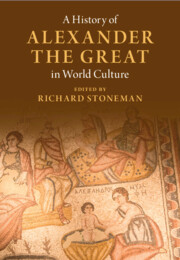Book contents
- A History of Alexander the Great in World Culture
- A History of Alexander the Great in World Culture
- Copyright page
- Contents
- Figures
- Notes on Contributors
- Preface
- Abbreviations
- 1 Introduction
- 2 Alexander and Alexandria in Life and Legend
- 3 The Image of Alexander in Ancient Art
- 4 Alexander, Philosophy and Rome
- 5 Christianising Alexander Traditions in Late Antiquity
- 6 Alexander in Ancient Jewish Literature
- 7 The Medieval Alexander
- 8 Alexander the Great and the Crusades
- 9 The Slavic Alexander
- 10 Alexander the Great in Byzantine Tradition, AD 330–1453
- 11 The Spanish Alexander
- 12 The Persian Alexander (1)
- 13 The Persian Alexander (2)
- 14 Alexander in Medieval Arab Minds
- 15 Alexander in the Age of Shakespeare
- 16 Alexander the Great in Opera
- 17 Alexander in the Long Eighteenth Century (c.1660–1830)
- 18 Images of Alexander in Germany
- 19 Alexander the Gay and the Gloryhole That Was Greece
- Index
- References
8 - Alexander the Great and the Crusades
Published online by Cambridge University Press: 13 January 2022
- A History of Alexander the Great in World Culture
- A History of Alexander the Great in World Culture
- Copyright page
- Contents
- Figures
- Notes on Contributors
- Preface
- Abbreviations
- 1 Introduction
- 2 Alexander and Alexandria in Life and Legend
- 3 The Image of Alexander in Ancient Art
- 4 Alexander, Philosophy and Rome
- 5 Christianising Alexander Traditions in Late Antiquity
- 6 Alexander in Ancient Jewish Literature
- 7 The Medieval Alexander
- 8 Alexander the Great and the Crusades
- 9 The Slavic Alexander
- 10 Alexander the Great in Byzantine Tradition, AD 330–1453
- 11 The Spanish Alexander
- 12 The Persian Alexander (1)
- 13 The Persian Alexander (2)
- 14 Alexander in Medieval Arab Minds
- 15 Alexander in the Age of Shakespeare
- 16 Alexander the Great in Opera
- 17 Alexander in the Long Eighteenth Century (c.1660–1830)
- 18 Images of Alexander in Germany
- 19 Alexander the Gay and the Gloryhole That Was Greece
- Index
- References
Summary
This chapter addresses how the Crusades spurred a renewed appropriation of Alexander in historiography, literature, images and cartography in late medieval Europe. Alexander’s legend was particularly relevant because it reflected the era’s geopolitical and epistemological complexity. The chapter focuses first on the ancient Alexander legend’s adaptation in Crusade-era texts including Crusade chronicles, epics, antique romances and encyclopedias. These works compare Alexander to Crusaders, present Alexander as a precursor of the Crusaders who fights Asian tyranny, interpolate Alexander into the stories of Crusaders through ekphrasis, and frequently cite the legend of Alexander’s enclosure of Gog and Magog. The chapter’s second part focuses on how manuscripts present Alexander as a proto-Crusader even if texts do not overtly describe him as such. Particular attention is paid to compilations that join Alexander and holy warriors (Judas Maccabeus, Godfrey of Bouillon), and to images that Christianise Alexander or demonise his foes. The final section examines the influence of Alexander’s legend on the apocalyptic geography of late medieval maps, which often depict Gog and Magog and other elements (toponyms, sites, monstrous peoples) of the Alexander tradition.
Keywords
- Type
- Chapter
- Information
- A History of Alexander the Great in World Culture , pp. 167 - 196Publisher: Cambridge University PressPrint publication year: 2022

